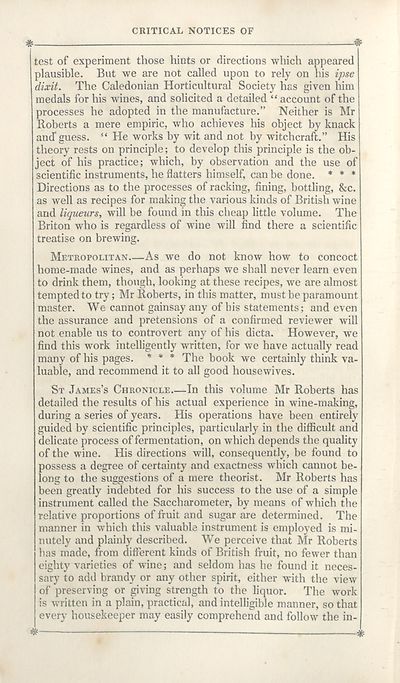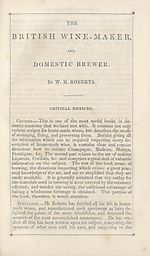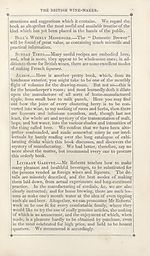Download files
Complete book:
Individual page:
Thumbnail gallery: Grid view | List view

CRITICAL NOTICES OF
'* * •
test of experiment those hints or directions which appeared
plausible. But we are not called upon to rely on his ipse
dixit. The Caledonian Horticultural Society has given him
medals for his wines, and solicited a detailed “ account of the
processes he adopted in the manufacture.” Neither is Mr
Roberts a mere empiric, who achieves his object by knack
and" guess. “ He works by wit and not by witchcraft.” His
theory rests on principle; to develop this principle is the ob¬
ject of his practice; which, by observation and the use of
scientific instruments, he flatters himself, can be done. * * *
Directions as to the processes of racking, fining, bottling, &c.
as well as recipes for making the various kinds of British wine
and liqueurs, will be found in this cheap little volume. The
Briton who is regardless of wine will find there a scientific
treatise on brewing.
Metropolitan As we do not know how to concoct
home-made wines, and as perhaps we shall never learn even
to drink them, though, looking at these recipes, we are almost
tempted to try; Mr Roberts, in this matter, must be paramount
master. We cannot gainsay any of his statements; and even
the assurance and pretensions of a confirmed reviewer will
not enable us to controvert any of his dicta. However, we
find this work intelligently written, for we have actually read
many of his pages. * * * The book we certainly think va¬
luable, and recommend it to all good housewives.
St James’s Chronicle In this volume Mr Roberts has
detailed the results of his actual experience in wine-making,
during a series of years. His operations have been entirely
guided by scientific principles, particularly in the difficult and
delicate process of fermentation, on which depends the quality
of the wine. His directions will, consequently, be found to
possess a degree of certainty and exactness which cannot be¬
long to the suggestions of a mere theorist. Mr Roberts has
been greatly indebted for his success to the use of a simple
instrument called the Saccharometer, by means of which the
relative proportions of fruit and sugar are determined. The
manner in which this valuable instrument is employed is mi¬
nutely and plainly described. We perceive that Mr Roberts
has made, from different kinds of British fruit, no fewer than
eighty varieties of wine; and seldom has he found it neces¬
sary to add brandy or any other spirit, either with the view
of preserving or giving strength to the liquor. The work
is written in a plain, practical, and intelligible manner, so that
every housekeeper may easily comprehend and follow the in-
'* * •
test of experiment those hints or directions which appeared
plausible. But we are not called upon to rely on his ipse
dixit. The Caledonian Horticultural Society has given him
medals for his wines, and solicited a detailed “ account of the
processes he adopted in the manufacture.” Neither is Mr
Roberts a mere empiric, who achieves his object by knack
and" guess. “ He works by wit and not by witchcraft.” His
theory rests on principle; to develop this principle is the ob¬
ject of his practice; which, by observation and the use of
scientific instruments, he flatters himself, can be done. * * *
Directions as to the processes of racking, fining, bottling, &c.
as well as recipes for making the various kinds of British wine
and liqueurs, will be found in this cheap little volume. The
Briton who is regardless of wine will find there a scientific
treatise on brewing.
Metropolitan As we do not know how to concoct
home-made wines, and as perhaps we shall never learn even
to drink them, though, looking at these recipes, we are almost
tempted to try; Mr Roberts, in this matter, must be paramount
master. We cannot gainsay any of his statements; and even
the assurance and pretensions of a confirmed reviewer will
not enable us to controvert any of his dicta. However, we
find this work intelligently written, for we have actually read
many of his pages. * * * The book we certainly think va¬
luable, and recommend it to all good housewives.
St James’s Chronicle In this volume Mr Roberts has
detailed the results of his actual experience in wine-making,
during a series of years. His operations have been entirely
guided by scientific principles, particularly in the difficult and
delicate process of fermentation, on which depends the quality
of the wine. His directions will, consequently, be found to
possess a degree of certainty and exactness which cannot be¬
long to the suggestions of a mere theorist. Mr Roberts has
been greatly indebted for his success to the use of a simple
instrument called the Saccharometer, by means of which the
relative proportions of fruit and sugar are determined. The
manner in which this valuable instrument is employed is mi¬
nutely and plainly described. We perceive that Mr Roberts
has made, from different kinds of British fruit, no fewer than
eighty varieties of wine; and seldom has he found it neces¬
sary to add brandy or any other spirit, either with the view
of preserving or giving strength to the liquor. The work
is written in a plain, practical, and intelligible manner, so that
every housekeeper may easily comprehend and follow the in-
Set display mode to:
![]() Universal Viewer |
Universal Viewer | ![]() Mirador |
Large image | Transcription
Mirador |
Large image | Transcription
| Antiquarian books of Scotland > Occupations > British wine-maker, and domestic brewer > (14) |
|---|
| Permanent URL | https://digital.nls.uk/126000089 |
|---|
| Description | Thousands of printed books from the Antiquarian Books of Scotland collection which dates from 1641 to the 1980s. The collection consists of 14,800 books which were published in Scotland or have a Scottish connection, e.g. through the author, printer or owner. Subjects covered include sport, education, diseases, adventure, occupations, Jacobites, politics and religion. Among the 29 languages represented are English, Gaelic, Italian, French, Russian and Swedish. |
|---|

